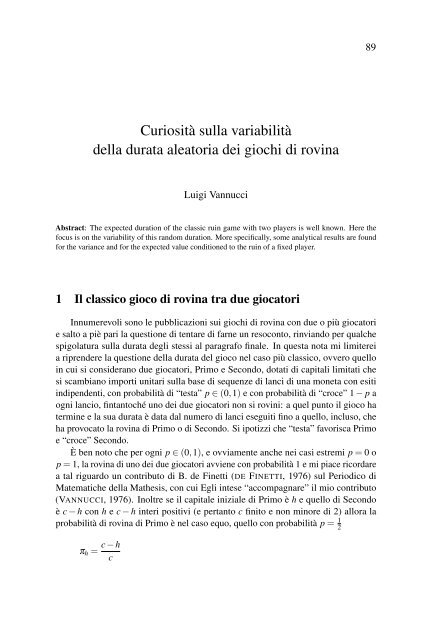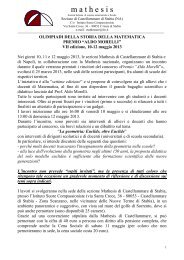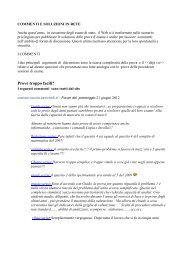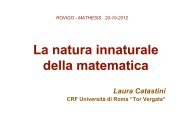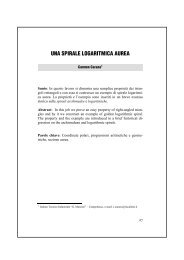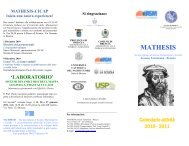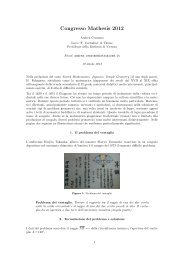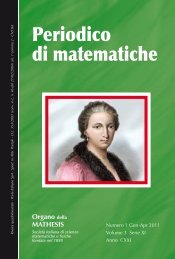Periodico di matematiche - Mathesis
Periodico di matematiche - Mathesis
Periodico di matematiche - Mathesis
Create successful ePaper yourself
Turn your PDF publications into a flip-book with our unique Google optimized e-Paper software.
✐<br />
✐<br />
Curiosità sulla variabilità<br />
della durata aleatoria dei giochi <strong>di</strong> rovina<br />
Luigi Vannucci<br />
Abstract: The expected duration of the classic ruin game with two players is well known. Here the<br />
focus is on the variability of this random duration. More specifically, some analytical results are found<br />
for the variance and for the expected value con<strong>di</strong>tioned to the ruin of a fixed player.<br />
1 Il classico gioco <strong>di</strong> rovina tra due giocatori<br />
Innumerevoli sono le pubblicazioni sui giochi <strong>di</strong> rovina con due o più giocatori<br />
e salto a piè pari la questione <strong>di</strong> tentare <strong>di</strong> farne un resoconto, rinviando per qualche<br />
spigolatura sulla durata degli stessi al paragrafo finale. In questa nota mi limiterei<br />
a riprendere la questione della durata del gioco nel caso più classico, ovvero quello<br />
in cui si considerano due giocatori, Primo e Secondo, dotati <strong>di</strong> capitali limitati che<br />
si scambiano importi unitari sulla base <strong>di</strong> sequenze <strong>di</strong> lanci <strong>di</strong> una moneta con esiti<br />
in<strong>di</strong>pendenti, con probabilità <strong>di</strong> “testa” p ∈ (0,1) e con probabilità <strong>di</strong> “croce” 1 − p a<br />
ogni lancio, fintantoché uno dei due giocatori non si rovini: a quel punto il gioco ha<br />
termine e la sua durata è data dal numero <strong>di</strong> lanci eseguiti fino a quello, incluso, che<br />
ha provocato la rovina <strong>di</strong> Primo o <strong>di</strong> Secondo. Si ipotizzi che “testa” favorisca Primo<br />
e “croce” Secondo.<br />
È ben noto che per ogni p ∈ (0,1), e ovviamente anche nei casi estremi p = 0 o<br />
p = 1, la rovina <strong>di</strong> uno dei due giocatori avviene con probabilità 1 e mi piace ricordare<br />
a tal riguardo un contributo <strong>di</strong> B. de Finetti (DE FINETTI, 1976) sul <strong>Perio<strong>di</strong>co</strong> <strong>di</strong><br />
Matematiche della <strong>Mathesis</strong>, con cui Egli intese “accompagnare” il mio contributo<br />
(VANNUCCI, 1976). Inoltre se il capitale iniziale <strong>di</strong> Primo è h e quello <strong>di</strong> Secondo<br />
è c − h con h e c − h interi positivi (e pertanto c finito e non minore <strong>di</strong> 2) allora la<br />
probabilità <strong>di</strong> rovina <strong>di</strong> Primo è nel caso equo, quello con probabilità p = 1<br />
2<br />
πh =<br />
c − h<br />
c<br />
89<br />
89


